{CMBA Films of the 1940’s Blogathon} February Movie of the Month: Somewhere I’ll Find You (1942)
This month, as Movie of the Month as well as my submission to the Classic Movie Blog Association’s Film of the 1940’s Blogathon, the focus is on 1942’s Somewhere I’ll Find You.
Clark Gable is Jonny Walker and Robert Sterling is Kirk Walker, brothers who work together as war correspondents for a New York newspaper, and are just returning from overseas. They aren’t home for long before they are competing for the affection of Paula Lane (Lana Turner), a reporter who flip-flops between the two. When Paula is sent on assignment to Indochina and disappears, the brothers are commissioned to find her. Once they do find her, Pearl Harbor happens and the three of them end up in Bataan: Jonny reporting for the paper, Kirk as a solider and Paula as a Red Cross nurse.
To me it seems like two films: it starts out as this rather silly story about two brothers chasing the same girl (and the girl seems to have no control over her own emotions, naturally) and then turns into an exotic adventure story as Clark and Robert journey to Asia to find Lana.
The scene where Clark and Lana meet for the first time is rather cute, with him inquiring who the unknown female is in the bathroom.
Clark and Lana were known as “the team that makes steam” and while I do agree that they have good onscreen chemistry, personally I have never found their onscreen pairings any steamier than Clark and Jean Harlow or Clark and Myrna Loy. In fact, I find this film the “least steamy” of their three films together.
The fault of that is probably on the silly plot. Lana’s character seems to flip flop between being an independant woman who needs nobody (especially a man!) and a damsel in distress that needs saving. It’s also a little disconcerting how she goes back and forth from loving one brother to another. You kind of wish both brothers would just ditch her.
Somewhere I’ll Find You was definitely a “flag waver” meant to inspire war bond sales. It’s one of those films that almost makes you wince with its not-so-subtle undertones of America marching in to save the world. There’s no doubting it when the last scene has Clark declaring quite boldly, “Remember that, Tokyo—more to come!”
If there seems to be some real feelings behind that declaration, your ears aren’t deceiving you. Somewhere I’ll Find You, if watched at face value, seems like just a passable film but its significance lies in what was going on behind the scenes.
Clark’s beloved wife, Carole Lombard, left Los Angeles on January 12 to board a train that would take her to her native Indiana for a bond tour. She had wanted Clark to accompany her but he couldn’t due to his commitment to Somewhere I’ll Find You. After selling over two million war bonds, she was supposed to return via train but instead opted to take a plane home on January 16. The plane carrying Carole, her mother, MGM publicity man and Gable friend Otto Winkler, plus 22 other passengers and crew, slammed into Table Rock Mountain in Nevada, killing all aboard.
Clark headed to the site of the crash and was left with the responsibility of bringing back the horribly burned bodies of his wife, his mother-in-law and his friend. The funeral for Carole and her mother was held on January 21 and Otto Winkler’s the following day. MGM did not pressure Clark to return to the set but studio head Louis B. Mayer was sweating the cost of keeping the production on hold. He had Robert Taylor ready and waiting to take over Clark’s part at a moment’s notice.
Clark was not one to not fulfill an obligation, personal tragedy or not, and returned to the set at the end of February. Upon his return, Louis B. Mayer summoned Lana Turner to his office. He told her that things were going to be very trying around the set. “Now Lana, here’s where you come in. You’re going to be very patient with him. If his mind wanders, don’t be upset, you just be ready at all times. If he wants to come in earlier, you be there before him. If he wants to work through lunch, do it. A lot of the pressure of this picture is going to be riding on your shoulders.” Lana agreed and said she’d do her best.
A completely different Clark arrived on the set. Usually he would sit on the set and play card games with the crew, eat in the MGM commissary and joke with the press. Not anymore. Clark read his lines, did his work and then would retreat to his dressing room. A guard stood outside the door so that nobody would enter and bother him. Sometimes Clark sat alone in the sun, outside the studio door, just sitting there with his face to the sun. Even then, a guard stood by him so that nobody would approach him. The set had a pallor over it, with everyone walking on eggshells.
Lana was horrified when the rumor got to her that Carole had taken the plane rather than the train home because she had suspected that Clark and Lana were having an affair. Lana vigorously denied ever having a romantic relationship with Clark and did so her entire life. Carole Lombard did tend to be rather jealous sometimes (who can blame her) and had visited the set of Clark and Lana’s film Honky Tonk the previous year. More on that here. One crude rumor is still out there that Clark was in bed with Lana when he learned that Carole’s plane had crashed. Complete and utter nonsense. Clark was at home, at the ranch, when he received the phone call from MGM publicity man Howard Strickling; this has been confirmed by numerous witnesses. The Clark and Lana rumors are ones that there are absolutely no evidence of. It seems to me that Clark gets this reputation and then every pretty girl he stars with he must have been sleeping with. Lana was young, attractive and blonde, so of course Clark was sleeping with her! Nonsense. I am not a huge Lana Turner fan and I know she “got around” but I have always believed her regarding Clark. The pieces of the puzzle just don’t fit. I have examined this issue here.
In her autobiography, Lana recounted an awkward dinner she had with Clark during filming:
[Louis B. Mayer said],”We’re trying to arrange for people to go home with [Clark] for dinner. If he should ask you, go. Agreed?”“But I don’t know him that well,” I said.
“Never mind. Just do as I say.”
“I’ll try with all my heart,” I promised him.
One night Clark did invite me for dinner. A studio limousine delivered me to the house he had shared with Carole. His male servant served the meal. As we ate I chattered brightly, trying to ease the sorrow that lined his handsome face. But he never mentioned it. He was courtly, and cordial, and far too private for that.
After dinner Clark showed me his gun collection. He had been polishing some of the pieces–a cherished hobby, I thought, that gave him comfort now. Then the studio limousine arrived to take me home.
After that evening my esteem for him grew even greater. That was the first and only social occaison I ever shared with him, though we made two more pictures together and got along well. His willingness to finish the film at all showed his decency. And although some say they could see a difference in the way he performed before and after the tragedy, I for one was not able to detect it. He was the consummate professional. No wonder they called him the King.
Robert Sterling later recalled that before Carole had left, she had sent Clark a rose that had sat on his dressing room table. Some fake doves she had sent him were draped over his dressing room mirror. “She was just a groovy lady,” Robert said, “He adored her.” When Clark returned to the set after her death, “he wasn’t the same. He seemed lost. I think he only went back to work to avoid being at home alone. And at the set he was just reminded too that he had lost Otto as well.”
Wesley Ruggles, the director, later commented on Clark’s behavior on set, “We were all frightened, unsure what to do or how to treat him. But he never asked for any favors or special consideration. He knew all his lines and did his work, gave no trouble. The only thing I will say is that his eyes were sad. When I see the film now, I still see it.”
Ironically, the only other film in which Ruggles had directed Gable was his one feature costarring Lombard: No Man Of Her Own. (Ruggles directed Lombard in True Confession and Bolero as well).
The title “Somewhere I’ll Find You” hit a bit too close to home, so an announcement was made that it would be changed to “Red Light.” Clark was a bit perturbed that they would change it on his account and so it was released under the original title.
By the time the film was released in August, Clark had already been sworn into the United States Army and was in training camp. Somewhere I’ll Find You would be his last appearance on the screen for three years.
You can read more about the film here and see over 100 pictures from the film in the gallery.
Read more of the posts featured in the CMBA’s Films of the Forties Blogathon at
http://clamba.blogspot.com/2013/01/fabulous-films-of-1940s-blogathon.html
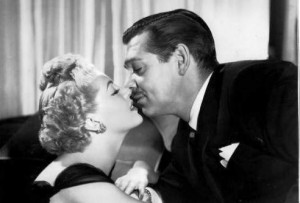
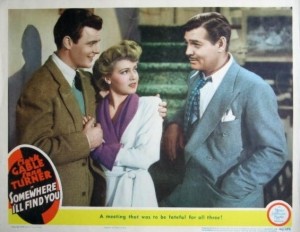
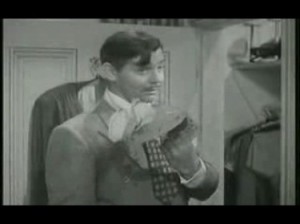
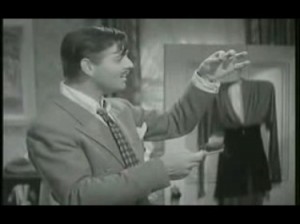
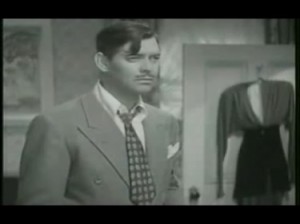
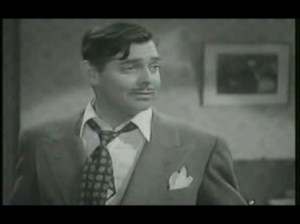
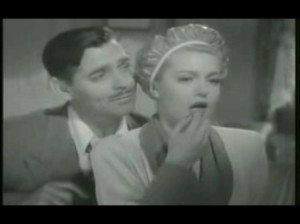
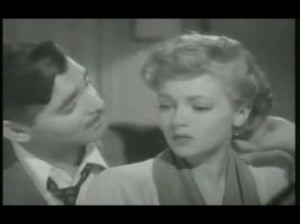
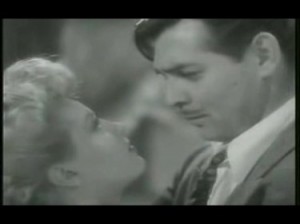
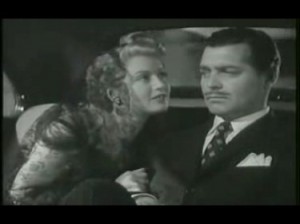
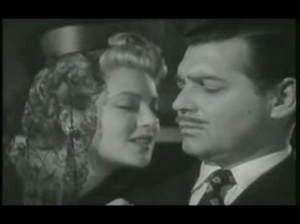
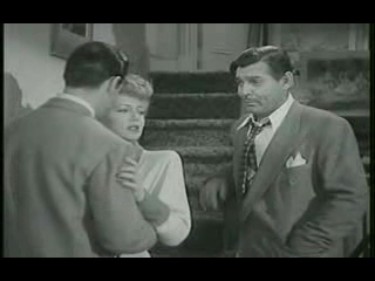
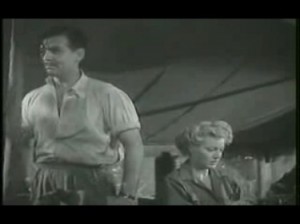
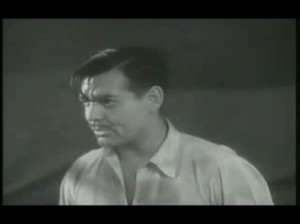
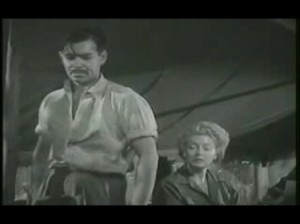
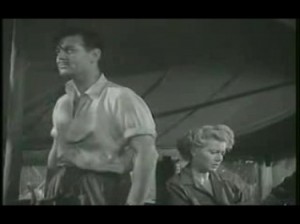
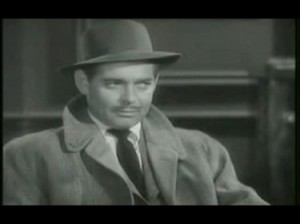
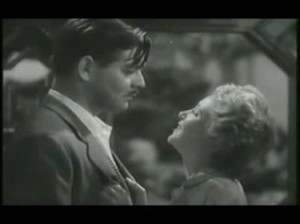
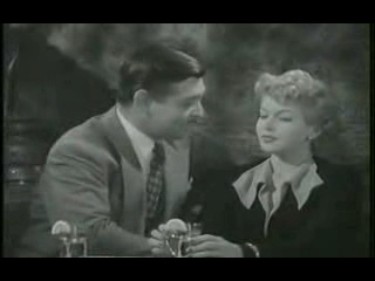
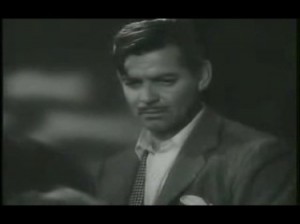
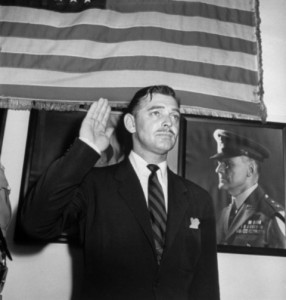
11 Comments
Patricia Nolan-Hall (Caftan Woman)
Fascinating article and look at the people behind what I’ve always considered a rather silly little movie. Kindness is most important in times of loss and the kindness afforded Clark Gable impresses me. He must have been worth it.
Rick
I haven’t seent this film (which does indeed sound like two separate movies). The background info was fascinating..and tragic.
KimWilson
Interesting backstory regarding this film. I have never seen this, but in your pics I do detect a sad look in Gable’s eyes.
FlickChick
Oh dear, I have to control the urge to start sobbing. No matter how many times I read about Carole’s death and the effect it had on Gable, I just go to pieces. I’m glad Lana was a stand up dame and defended him. As for the film, Gable & Sterling as brothers intrigues me…
A swell post – most interesting!
Patti
While those Hollywood men (and women) got around, it’s nice to think that Clark was faithful to Carole and that he really was not having an affair with Lana.
What is strange about that snippet from Lana’s autobiography is that she mentions making 2 more films with Clark…but didnt’ they make a total of 4 films together? “Homecoming” (my favorite), “Honky Tonk,” “Betrayed,” and “Somewhere I’ll Find You.”
Thanks for the interesting look behind the scenes.
Aubyn Eli
To tell the truth, I’ve avoided this film because the thought of Gable fighting through his grief to make it is too sad. It’s nice to hear Lana’s thoughts on the matter and her own concern for him.
Kevin Deany
Sad, but fascinating background info on the making of this film.
Classicfilmboy
I have not seen this film, so I will have to look for it, if only for how it fits into Gable’s career. Your background on the movie was fascinating, and I didn’t know any of it. Thank you for sharing!
Louisa Jacqueline Holmes
I often read quite nasty remarks by people..mainly around the anniversary of Carole’s death..concerning the remarks that you have made Meredith..I JUMP to Clark’s defense and say that they should take note of your site and learn/read of the REAL truths about these stories/rumours!..The rumour about Clark supposedly being in bed with Lana when he receives the phone call about Carole’s plane particularly angers/sickens me when I KNOW it isn’t true..I sometimes wonder if some people WANT to believe the rumours?!..I KNOW Meredith that YOU are THE ‘expert’ on Mr Gable and only wish that YOU could ‘alter’ these peoples ‘mind-sets’!..It’s ‘strange’ that even now with all the evidence to the contrary that this rumour refuses to go away!..Anyway I KNOW that they are wrong and admire Clark’s sheer character and strength in actually being able to finish this film SUCH a private humble and admirable man..As Lana said ‘No wonder they called him the ‘King’..He WAS for sure!…
R.A. Kerr
Such a tragedy, and you’ve written about it beautifully. Thanks for sharing this sad story with us.
Gail Kennedy
Couldn’t agree with you more, Louisa, but sadly we humans love juicing up stories making them sound more intriguing, and as they gather momentum, little bits keep being added to it. A bit like a snowball rolling down a hill, getting bigger and bigger on its journey. I have said this before, the dead cannot defend themselves, they are such voicless targets. I listen to the people that matter the most, Gable and Lombards true friends, the people that really knew them. Have viewed countless interviews over the years, and they all say the same, they were so in love.